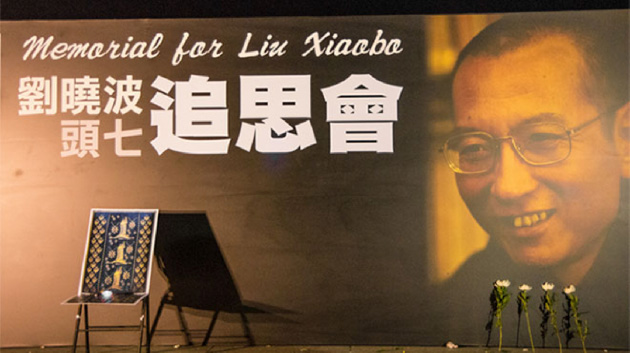China Anxious About Liu Xiaobo’s Funeral
His Body May be Dead but His Soul and Spirit Remain
It has been two weeks since the death of Nobel Peace Prize laureate and Chinese human rights activist, Liu Xiaobo.
The Beijing government refused Liu’s request to receive medical treatment overseas despite the welcome stance taken by hospitals in the U.S. and Germany. Liu died in Chinese custody.
Chinese tradition has it that the soul of the deceased returns on the 7th day after his or her death. In Liu’s case, it would have been July 19th. On that day, around 1,500 pro-democracy Hong Kong citizens attended a mourning ceremony in their hometown.
Authorities in Mainland China, on the contrary, prohibited supporters from leaving their homes on the 19th, and kept strict watch over them to arrest any who attempted to attend mourning services.
Authorities Fear Sanctification of Liu’s Grave
On the 15th, Shengyang authorities held a press conference where Liu’s brother Xiaoguang said they scattered Liu’s ashes into the sea immediately after cremation. Authorities claimed that it was the family’s own request, and brought in Xiaoguang to verify this.
This press conference was, however, organized by the city authorities, and knowing Chinese politics it is hard to imagine that Xiaoguang had the freedom to say what he wanted. In fact, sources suggest that it was the government that demanded Liu’s wife Liu Xia scatter the ashes, a request which she refused. This is contradictory to the press conference announcement.
Why, then, do Chinese authorities circumvent the erecting of Liu’s grave?
This is most likely because the authorities are afraid of Liu’s grave becoming a sanctum for the pro-democracy movement. It is clear what the Chinese authorities are truly afraid of.
A Place for Supporters to Communicate with Liu
Master Ryuho Okawa, founder and CEO of Happy Science said the following in his book on the correct mindset in approaching a memorial service for the dead:
“A grave acts as a kind of antenna. So, through memorial services such as visiting graves and enshrining memorial tablets [N.B., an East Asian tradition], one can communicate with the dead who now reside in Heaven or Hell. This is why it is actually very important.”
Liu’s grave would not only become a gathering place for his supporters, it would become a place for them to spiritually communicate with Liu. This would bring further energy and conviction to China’s democratization and liberalization. If more and more people awaken to this stance, the power will definitely find its outlet in concrete democratization.
During his house arrest, Liu directed his thoughts to the victims of the Tiananmen Square Massacre. “Their bodies – thirsting for freedom – may have died, but their spirits lives on in the resistance,” he recollected.
What the Chinese government most fears, is for people to begin believing in the indestructibility of the soul and the ability to become one with the martyrs of liberty and love, such as Liu Xiaobo.
A Revolution for Democracy Through Information Disclosure
Chinese authorities have now tightened their media censorship and Internet surveillance to prevent Liu Xiaobo’s name from spreading around the country. In China, search engines return the search “Liu Xiaobo” with a “could not find”, and related posts in Weibo – the Chinese equivalent of Twitter – are immediately deleted.
This absurdly tight information censorship further confirms the government’s anxieties towards their people becoming encouraged by Liu Xiaobo’s courageous life. Seen from a different angle, this also means that information disclosure is the key to democratization.
Liu’s death has cause a stir in the global community, and world leaders and luminaries have left comments paying their respects:
U.S. President Trump ex-spokesman, Sean Spicer: “A poet, scholar, and courageous advocate, Liu Xiaobo dedicated his life to the pursuit of democracy and liberty.”
Taiwanese President Tsai Ing-wen: “If the Chinese Dream is democracy, then Taiwan will provide any assistance necessary to achieve this objective. I believe that this is what he [Liu] would have wanted.”
Nobel Peace Prize laureate, Malala Yousafzai: “I’m hoping that people will learn from what he [Liu] did and join together and fight for freedom, fight for people’s rights and fight for equality.”
Liu’s wife, Liu Xia, is still held under house arrest as she has been for the past 7 years, and is unable to gain access to outside communications. The people of Europe and the U.S. have been demanding her freedom, and human rights organizations have been actively gathering petition signatures online. The global community is rising up against China’s infringement of human rights.
If Liu’s supporters carry on the dream, and enlighten the people of China to the truth, it will be possible to truly free the people from the one-party abuse of human rights in China.



















